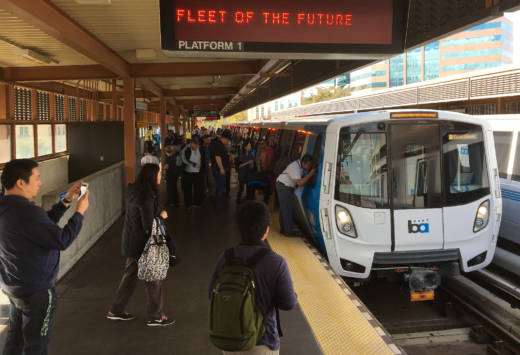Those particulars aside, East Bay board member Rebecca Saltzman said the biggest impact for BART's long- and loudly suffering ridership is the expected impact on relieving crowding on the system.
"They're going to bring added capacity since we'll have more train cars," Saltzman said. "So ultimately it means that those eight- or nine-car trains we're running during commute hours will turn into 10-car trains. It's going to be a huge relief to BART riders."
Original post: State regulators have given the green light for BART to begin carrying passengers on the first 10 of its new "Fleet of the Future" cars.
The California Public Utilities Commission told BART General Manager Grace Crunican in a letter released Wednesday evening (embedded below) that it considered a test run last week to have been a success. The test, conducted Jan. 9 with CPUC inspectors aboard, ran a train consisting of 10 cars through the entire BART system. (In transit agency argot, the train was a "10-car consist.")
Only one glitch was reported during the run, when train doors failed to open at the downtown Berkeley station. BART attributed that hiccup to a problem with trackside equipment, not with the cars themselves.
The CPUC's approval applies only to the 10 cars involved in the test run.
The commission's action has now prompted BART to prepare to put a train with those 10 approved cars into service in the coming days, agency spokeswoman Alicia Trost said in an email Thursday morning.
BART says Montreal-based manufacturer Bombardier has delivered another 10 cars, but the CPUC said that, "given the experience on the first group of cars," it will require the next 10-car group to undergo a test run identical to the one conducted last week. Cars received in the future are expected to be subjected to a more streamlined approval process.
BART first asked the CPUC to grant a safety certification for the new cars on Oct. 30. But commission inspectors withheld the approval after the 10-car pilot train suffered two significant failures during a test run in early November.
At one point, a system that was supposed to help the onboard control computer keep track of the train's length failed. That caused the train to go into a safe mode and operate as if it were a three-car train instead of the 10-car train it actually was.
“And so the trailing seven cars were essentially drones — the doors wouldn’t open and the train operator wasn’t able to control those cars,” BART spokesman Jim Allison said in November.
A separate hardware problem also prevented doors from opening.
The delays caused by those issues added to a long series of delays that have slowed introduction of the new fleet long past its planned late 2016 debut.
BART intends to buy 775 of the cars from Bombardier, at a total cost of about $2.6 billion, to replace its current fleet. The district also hopes to find the cash — perhaps in a regional bridge toll measure expected to go to voters in June — to buy an extra 300 or so cars — a number that would help it to ramp up transbay service and handle expected ridership demand on its Silicon Valley expansion.
This post was updated Thursday morning to include information attributed to a BART spokeswoman.

